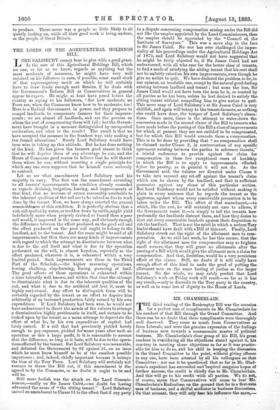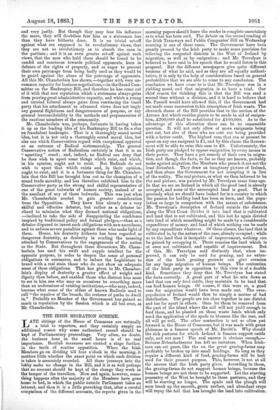MR. CHAMBERLAIN.
THE third reading of the Bankruptcy Bill was the occasion 1 for a perfect rain of compliments on Mr. Chamberlain for his conduct of that Bill through the Grand Committee. And there can be no doubt that these compliments were thoroughly well deserved. They came as much from Conservatives as from Liberals, and were the genuine expression of the feelings of business men towards a consummate master of political business. Mr. Chamberlain's clear grasp of his Bill, his great candour in considering all the objections stated against it, his courtesy in meeting those objections as far as it was practic- able for him to do so, and his skill in keeping the discussion in the Grand Committee to the point, without giving offence to any one, have been attested by all his colleagues on that Committee ; nor can it be questioned that so far as Mr. Glad- stone's expedient has succeeded and inspired sanguine hopes of farther success, the credit is chiefly due to Mr. Chamberlain. And this will go to his credit with all parties. We do not, of course, mean that Conservatives will cease to fear ?dr. Chamberlain's Radicalism on the ground that he is a first-rate ;man of business, and a skilful mediator in business discussions. On that account, they will only fear his influence the more,—
and very justly. But though they may fear his influence the more, they will doubtless fear him as a statesman less than they have hitherto done. It is no trivial set-off against what are supposed to be revolutionary views, that they are not so revolutionary as to absorb the man in the partisan ; and it is an even greater set-off against such views, that the men who hold them should be found to be candid and courteous towards political opponents, keen in defence of the rights of property, and- as eager to prevent their own patronage from being badly used as they would be to guard against the abuse of the patronage of opponents. All this Mr. Chamberlain has shown,—together with very un- common capacity for business negotiations,—in the Grand Com- mittee on the Bankruptcy Bill, and therefore he has come out of it with that new reputation which a statesman always gains from proving great administrative capacity, and which a young and untried Liberal always gains from convincing the timid party that his attachment to advanced views does not imply any general flightiness and dangerousness of purpose, or any general irreconcilability to the methods and prepossessions of the cautious members of the community.
Mr. Chamberlain was, perhaps, fortunate in having taken it up as the leading idea of his Bankruptcy Bill to fix a slur on fraudulent bankrupts. That is a thoroughly sound moral idea, but it is not only a thoroughly sound moral idea, but also one which Conservatives regard with exceptional approval as an outcome of Radical statesmanship. The general Conservative notion of Radicalism certainly is that it is an " upsetting" creed ; and, indeed, no Radical can deny that he does wish to upset some things which exist, and which, in his opinion, ought not to exist. But Radicals do not wish to upset that which exists and, in their opinion, ought to exist, and it is a fortunate thing for Mr. Chamber- lain that this Bill has brought him out as the champion of a sound trade morality, and has therefore exhibited him to the Conservative party as the strong and skilful representative of one of the great bulwarks of human society, instead of as the assailant of any of those bulwarks. This was just what Mr. Chamberlain needed to gain greater consideration from the Opposition. They knew him already as a very skilful and effective debater, but rather as a debater in- clined to minimise what they deemed national obligations, —inclined to take the side of disappointing the confidence inspired by traditional policy and formal pledges,—than as a debater disposed to invest such obligations with new sacredness, and to enforce severe penalties against those who make light of them. Hence, his dexterity hitherto has been regarded as dangerous dexterity, as dexterity in evading the meaning attached by Conservatives to the engagements of the nation or the State. But throughout these discussions, Mr. Cham- berlain has used his swift and supple intellect for the opposite purpose, in order to deepen the sense of personal obligations in commerce, and to induce the Legislature to brand with a real stain those who do not show an adequate sense of these obligations. That has given to Mr. Chamber- lain's display of dexterity a greater effect of weight and dignity than before, and enabled those who distrust him most to see in him one who may on occasions be something more than an underminer of existing institutions,—who may, indeed, become what some of the oldest of known Radicals used to call "the repairer of the breach, the restorer of paths to dwell in." Probably no Member of the Government has gained so much in reputation by the Session which is all but over, as Mr. Chamberlain.



































 Previous page
Previous page